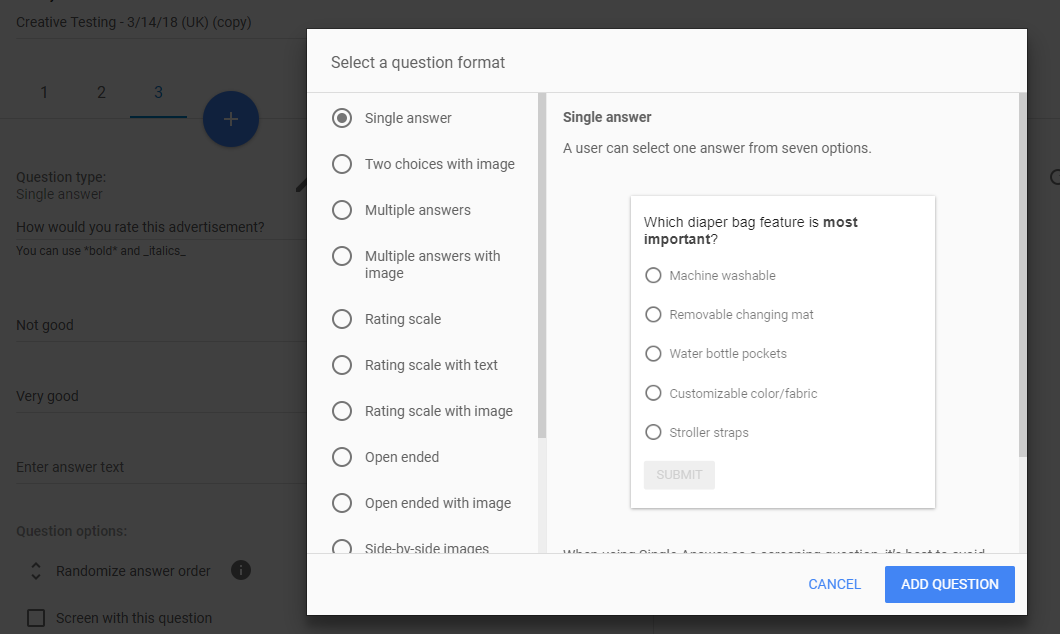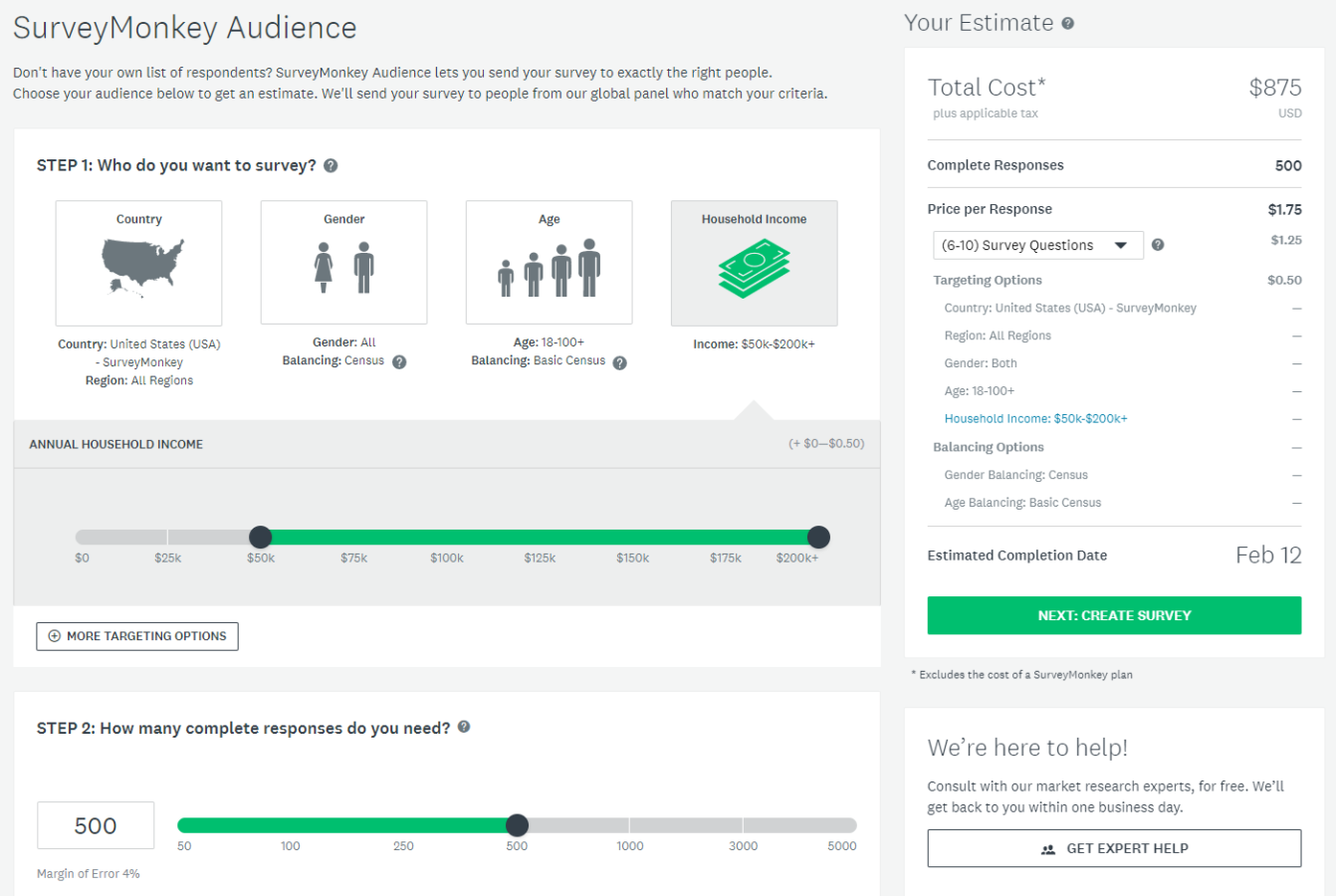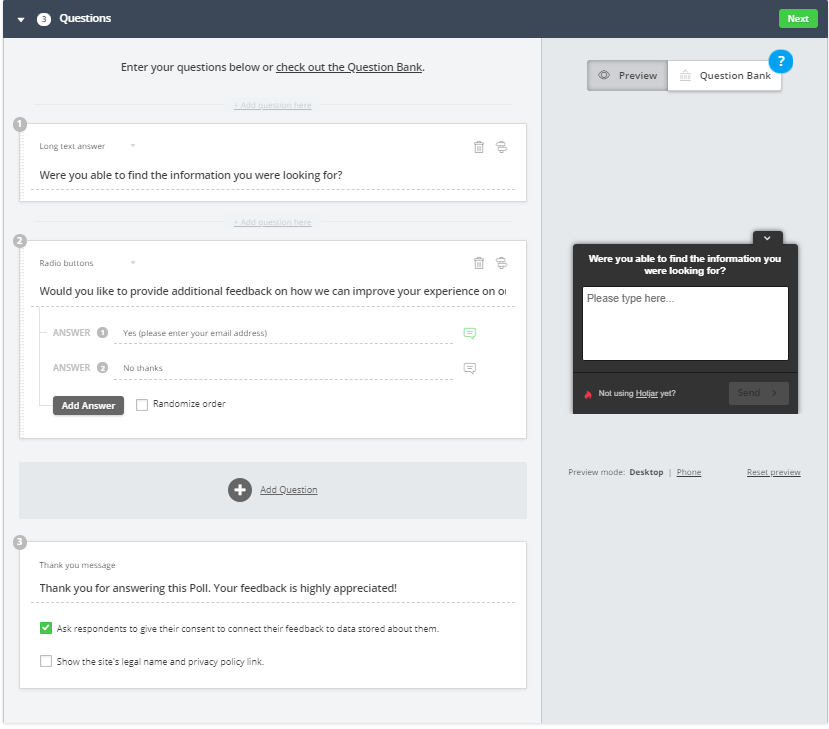What are “Competitor Surveys”?
This isn’t a new or earth-shattering concept but just like how you can run surveys to learn more about how users perceive your product, redesigned website, or new branding, you can use them to learn more about your competitors. Anything you can ask about your company, you can ask about your competitors.
Below we’ll provide some pros and cons of the most popular survey tools we use at Seer and how they can be leveraged to run competitor surveys.
Do you already have a preferred survey tool? If yes, take a look at our example survey questions by skipping to the second half of this post.
Survey Tools
Google Surveys (Surveys 360)
Google Surveys runs surveys to a panel of tens of million participants and 4M mobile users worldwide but can also be further targeted to specific countries or regions. Google Survey is a relatively inexpensive and quick way to learn about your audience, straight from the source.
Surveys are distributed among +1,500 sites and generally cost between $0.10 and $3 (the price increases with more screener questions and audience targeting).
To learn more about Google Surveys read here.

Pros
- Easy to use reporting interface that has data visuals & segments like gender, age group, or another question for comparison
- Sample bias and statistical significance indicators to let you know how accurate and useable your survey responses are
- 13 question types

Cons
- Limited conditional logic between questions
- 10 question limit (including screener questions)
SurveyMonkey
SurveyMonkey runs surveys to +50M panelists in over 100 countries worldwide via their Contribute and Rewards Panels or Global Panel. You can use SurveyMonkey's audience list or send your survey to your own audience via a weblink or email. This platform has both free and monthly plans for users who might run surveys fairly regularly rather than as one-time projects.
To learn more about SurveyMonkey read here.
Pros:
- Targeting options can go from more general attributes like Country and Demographics (age, gender, and household income) to very specific like job title and time spent on the internet per week.
- Surveys can go from 1-5 questions to 40-50 questions
- Express Delivery as an addon you get your responses within one business day

Cons:
- Can be slightly more expensive than Google Surveys ranging from $1 to $10 per survey response for a 6-10 question survey (without any targeting/screener questions) in addition to the monthly plan
- The free plan had limitations that don’t offer great value to users who’d like to use the free option offered
Hotjar Surveys
Surveys can also be run on platforms like Hotjar, which only run polls/surveys on the website their code is deployed on. So a website specific survey would not allow you to spy on your competitors.
To learn more about how you can use Hotjar surveys and other features, click here.

10 Questions to Ask in a Competitor Survey
What are your burning questions about your competitors?
How is their brand perceived to your target audience? What are they doing right/wrong?
Below are some example questions that can be used in a competitor survey to equip you with all the answers you need to make marketing/business decisions whether it is proactive or reactive to what your competitors are doing.
Asking your audience the right questions can help you decode the mystery of success.
You are Company A and your competitor is Company B.
Q1: When considering a _______ company, what features are most important to you?
A: List of 3-5 features [pick multiple]
Answer decoded: Now you know what is important to potential customers like “online reviews” or “24/7 sales support”
Q2: What’s one thing that Company B does better than competitors?
A: Short Answer
Answer decoded: Now you know what your competitor’s unique selling proposition is and can include this in your marketing messaging
Q3: What can Company B do to improve their products?
A: List of 3-5 aspects
Answer decoded: Now you know your competitor’s weakness(es) and can promote your strengths
Q4: What can Company A do to improve their products?
A: List of 3-5 aspects
Answer decoded: Now you know what your perceived weakness(es) are and can work to improve them.
Q5: How loyal are you to Company B on a scale from 1 to 5? (1 being the lowest and 5 being the highest)
A: Scale of 1-5
Answer decoded: Now you know if their customer base is solid or can be subject to change and can swoop in for the kill.
Q6: What is your perception of Company A on a scale from 1 to 5? (1 being negative and 5 being positive)?
A: Scale of 1-5
Answer decoded: Now you know what people think of your business - is it what you expected or will you have to make changes?
Q7: What is your perception of Company B on a scale from 1 to 5? (1 being negative and 5 being positive)?
A: Scale of 1-5
Answer decoded: Now you know what people think of your competitor’s business - is this what you expected and/or how can you use this to your advantage.
Q8: What would make you decide to purchase from Company B rather than Company A?
A: List of 3-5 aspects
Answer decoded: Now you know what the deciding factor is (price, warranty, etc.) and can make sure you are the one that is chosen.
Q9: Please rate Company A’s Website based on this statement: It was easy to find all of the information I was looking for on Company A's website.
A: Likert Scale of Strongly Disagree, Disagree, Neutral, Agree, Strongly Agree
Answer decoded: Now you know what users think of your website and its ease of use.
Q10: Please rate Company B’s Website based on this statement: It was easy to find all of the information I was looking for on Company B’s website.
A: Likert Scale of Strongly Disagree, Disagree, Neutral, Agree, Strongly Agree
Answer decoded: Now you know what users think of your competitor’s website - if there are features on Company B’s website users find valuable, you might consider updating your website.
Disclaimer: And of course, we wouldn’t be Seer if we didn’t remind you NOT to collect any personally identifiable information (PII) whenever running a survey.
Wouldn't you like to know more about your competitors?
If you would like to run a survey for your company, reach out to Seer. Interested in learning more about audience research in general? Check out our most recent blog posts below or sign up for our newsletter for more content like this in your inbox:


